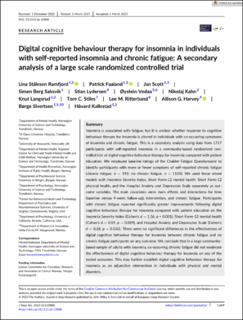| dc.contributor.author | Ramfjord, Lina Stålesen | |
| dc.contributor.author | Faaland, Patrick Michael Palmelund | |
| dc.contributor.author | Scott, Janine Linda | |
| dc.contributor.author | Saksvik, Simen Berg | |
| dc.contributor.author | Lydersen, Stian | |
| dc.contributor.author | Vedaa, Øystein | |
| dc.contributor.author | Kahn, Nikolaj | |
| dc.contributor.author | Langsrud, Knut | |
| dc.contributor.author | Stiles, Tore Charles | |
| dc.contributor.author | Ritterband, Lee M. | |
| dc.contributor.author | Harvey, Allison G. | |
| dc.contributor.author | Sivertsen, Børge | |
| dc.contributor.author | Kallestad, Håvard | |
| dc.date.accessioned | 2023-10-30T08:23:16Z | |
| dc.date.available | 2023-10-30T08:23:16Z | |
| dc.date.created | 2023-04-11T13:14:08Z | |
| dc.date.issued | 2023 | |
| dc.identifier.citation | Journal of Sleep Research. 2023, 32 (5), . | en_US |
| dc.identifier.issn | 0962-1105 | |
| dc.identifier.uri | https://hdl.handle.net/11250/3099285 | |
| dc.description.abstract | Insomnia is associated with fatigue, but it is unclear whether response to cognitive behaviour therapy for insomnia is altered in individuals with co-occurring symptoms of insomnia and chronic fatigue. This is a secondary analysis using data from 1717 participants with self-reported insomnia in a community-based randomized controlled trial of digital cognitive behaviour therapy for insomnia compared with patient education. We employed baseline ratings of the Chalder Fatigue Questionnaire to identify participants with more or fewer symptoms of self-reported chronic fatigue (chronic fatigue, n = 592; no chronic fatigue, n = 1125). We used linear mixed models with Insomnia Severity Index, Short Form-12 mental health, Short Form-12 physical health, and the Hospital Anxiety and Depression Scale separately as outcome variables. The main covariates were main effects and interactions for time (baseline versus 9-week follow-up), intervention, and chronic fatigue. Participants with chronic fatigue reported significantly greater improvements following digital cognitive behaviour therapy for insomnia compared with patient education on the Insomnia Severity Index (Cohen's d = 1.36, p < 0.001), Short Form-12 mental health (Cohen's d = 0.19, p = 0.029), and Hospital Anxiety and Depression Scale (Cohen's d = 0.18, p = 0.010). There were no significant differences in the effectiveness of digital cognitive behaviour therapy for insomnia between chronic fatigue and no chronic fatigue participants on any outcome. We conclude that in a large community-based sample of adults with insomnia, co-occurring chronic fatigue did not moderate the effectiveness of digital cognitive behaviour therapy for insomnia on any of the tested outcomes. This may further establish digital cognitive behaviour therapy for insomnia as an adjunctive intervention in individuals with physical and mental disorders. | en_US |
| dc.language.iso | eng | en_US |
| dc.publisher | Wiley | en_US |
| dc.rights | Attribution-NonCommercial-NoDerivatives 4.0 Internasjonal | * |
| dc.rights.uri | http://creativecommons.org/licenses/by-nc-nd/4.0/deed.no | * |
| dc.title | Digital cognitive behaviour therapy for insomnia in individuals with self-reported insomnia and chronic fatigue: A secondary analysis of a large scale randomized controlled trial | en_US |
| dc.title.alternative | Digital cognitive behaviour therapy for insomnia in individuals with self-reported insomnia and chronic fatigue: A secondary analysis of a large scale randomized controlled trial | en_US |
| dc.type | Peer reviewed | en_US |
| dc.type | Journal article | en_US |
| dc.description.version | publishedVersion | en_US |
| dc.source.pagenumber | 9 | en_US |
| dc.source.volume | 32 | en_US |
| dc.source.journal | Journal of Sleep Research | en_US |
| dc.source.issue | 5 | en_US |
| dc.identifier.doi | 10.1111/jsr.13888 | |
| dc.identifier.cristin | 2139975 | |
| cristin.ispublished | true | |
| cristin.fulltext | original | |
| cristin.qualitycode | 1 | |

